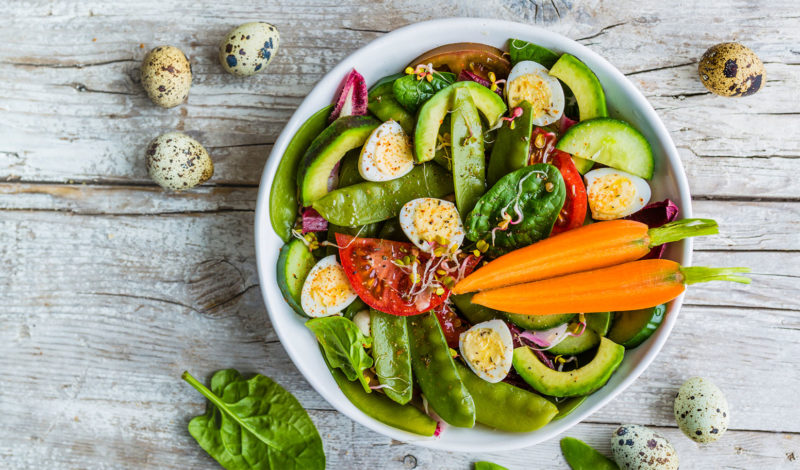Personalised nutrition: Everyone uses food differently: One person can eat a large piece of cake after a heavy main course [...]

How the change in diet succeeds
A permanent change in your own diet is not easy. The eating habits that you have trained for years remain stubbornly anchored in everyday life and are difficult to change. Many do not hold it out on a long-term basis to give up their old eating habits. But what happens if an intolerance or illness necessitates a change in diet? How do you then manage to stay consistent so that your body is permanently well?
What are the reasons for changing the diet?
A change in diet can make sense for many different reasons: Some people, for example, strive for a change in diet because they want to lose weight or because they want to improve their well-being in the long term and feel fitter. Others, however, are forced to stick to a certain diet because they are struggling with food intolerances. In the case of irritant bowel syndrome, diabetes mellitus, obesity and a variety of other diseases, a change in diet is also one of the main pillars of therapy. For the best possible effect, it is important that a balanced diet always goes hand in hand with a healthy lifestyle – this means sleeping well, drinking plenty of water and exercising regularly.
Diet change – tips for everyday life
In theory, it sounds simple: choose easily digestible foods, eat healthier, drink a lot. But in practice it’s often not as simple as it sounds. Unhealthy temptations on supermarket shelves often result in too many foods containing sugar ending up in the shopping cart again. The following tips should help you to change your diet in the long run:
If the change in diet is to succeed, a positive attitude is helpful. Finally a healthy diet should not resemble punishment, but lead instead to more well-being. Always remember therefore, which positive effects another nutrition can have.
Eating healthy does not always mean eating the same boring dishes. You can also experiment with healthy foods and discover a variety of new recipes for yourself.
If, for example, your change in diet serves to reduce weight, you should set yourself intermediate goals. So don’t lose 20 kilos of weight, but for example 5 kilos in three months. It is important that the goals are realistic. As soon as you have reached a goal, this will motivate you even more and by the way you will feel fitter.
Pre-cooked frozen dishes look tasty and can be prepared quickly. But fast food usually also contains unnecessary and unhealthy additives. If you cook your meals yourself, you know exactly what is contained in the dishes and avoid unnecessary additives. For example, use fresh herbs instead of artificial flavours. If you cook a little more, you can take the rest with you to university or work the next day and have a nutritious lunch ready the next day.
Of course, this does not mean that you should completely do without sugar and fats. The rule is: It’s the amount that counts. If you eat too much sweets, you increase in the long run. It is best to replace the chocolate bar in the evening with vegetable sticks or an apple – the natural sweetness from fruits is much healthier than refinery sugar.
Turn away your favorite recipes: In everyday life, it is important not only to leave out sweets, but also to replace the very calorie-rich ingredients with lighter alternatives at mealtimes. At breakfast, for example, use a low-fat cream cheese or low-fat curd instead of butter and replace cream for homemade food with low-fat milk.
Supporting the change in diet – but how?
Before you change your diet, you can have your doctor examine you thoroughly. Not only people with diabetes mellitus or Crohn’s disease need a balanced diet and regular medical check-ups. Also for people with certain intolerances, deficiency symptoms or excessive uric acid levels, it is important to draw up a plan to accompany the change in diet, which includes practical recommendations for a proper diet.
If you have unexplained stomach or intestinal problems, a nutrition diary may also be useful. With this you can find out which foods cause you discomfort. You should make a note of the following:
- What kind of food did you eat?
- When did you eat or drink it
- When and to what extent did your complaints occur?
- Was there a stressful situation for you at the same time?
In addition, the stool test INTEST.pro from BIOMES can help you with your diet change
Thanks to the latest biotechnological methods1, the detailed online evaluation of the test will provide you with all the important characteristics of your intestinal flora, you can get to the bottom of your complaints and and to optimise your own nutrition plan for your intestinal flora.
If necessary, your change of diet can also be supported by the targeted intake of an individual probiotic dietary supplement.
1. Cho I, Blaser M J. The human microbiome: at the interface of health and disease. Nature Reviews Genetics 2012:13, 260-270. ↩


